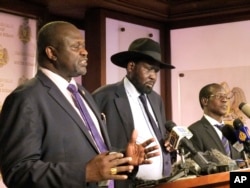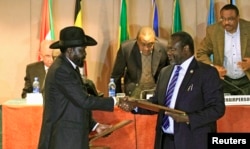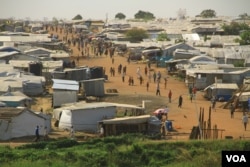South Sudan's government says it wants to bring peace and stability in the country this year, after three years of fighting. The government is putting its hopes on the recently launched national dialogue.
South Sudan ended 2016 with more clashes between government forces and opposition fighters allied to Riek Machar.
More clashes reported
As officials try to put together a team to lead the national dialogue, tension remains high in the countryside and clashes are a common occurrence.
A senior member of the Sudan People’s Liberation Movement in Opposition, Peter Adwok Nyaba, says the country's future lies in implementing the peace agreement that President Salva Kiir and Machar signed in August 2015.
“The peace agreement was an opportunity to retain stability and sanity to the people of South Sudan. Unfortunately, it's Salva himself who abrogated this peace agreement by attacking and chasing the chairman of SPLM-IO to all the way to Congo and started ... military operations against our people.”
South Sudan descended into chaos in December 2013 after Kiir accused his former deputy Machar of planning to overthrow the government. Civil war broke out when soldiers from Kiir's Dinka tribe and Machar’s Nuer tribe started targeting each other.
The peace deal, signed in Addis Ababa, was an attempt to end the fighting. The two sides formed a transitional unity government and agreed to a cease-fire.
But last July, new violence flared in Juba, killing hundreds of people. The clashes led to Machar fleeing the country.
The three-year war has now forced more than two million people from their homes and claimed the lives of tens of thousands of South Sudanese.
Call for national dialogue
Kiir launched the national dialogue in mid-December, calling for his countrymen to participate in the talks. But opposition members have expressed fear the environment is not favorable for negotiations.
Deputy Information Minister Akol Paul Kordit disagrees.
“We as a government strongly believe the environment is conducive for dialogue," he said, "but should any other South Sudanese think that the environment is not conducive for dialogue let him come forward and tell us why does he think that the environment is not conducive for dialogue and what he think should be done to make the environment conducive. So this is the essence of dialogue we shall dialogue over every step, over every issue of concern in our country.”
Researcher and Policy Analyst with Sudd Institute Nhial Tiitmamaer says there is no political will to end the crisis.
“People in South Sudan want peace, but this peace is seen as not having that wide acceptance, and that is why you see it is struggling. It is difficult to be implemented because of the fact that all the parties are not embracing it and the society as a whole they want peace, but not in a way this peace was designed," he said.
Opposition leader Machar is currently in South Africa, and there has been no indication when or if he may return.







